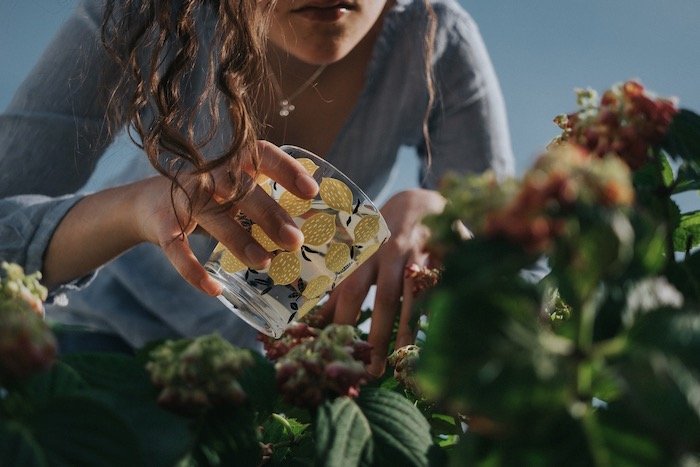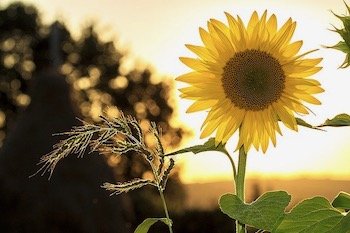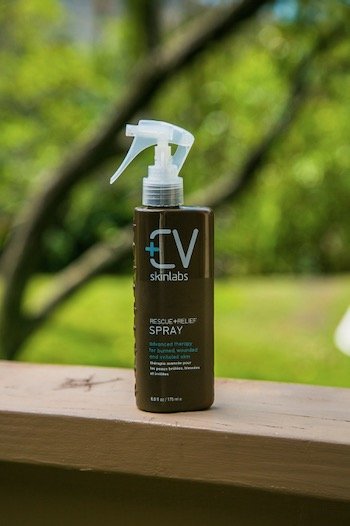
If you’re looking forward to gardening this summer, but you’re worried about an eczema flare-up, this post is for you!
Gardening can help you live a healthier, more stress-free life, but not if it causes skin problems. Unfortunately, for those with eczema, that’s often what happens.
Does that mean you have to avoid gardening and give up all its benefits just because you have this skin condition? We certainly hope not! Below, we provide several tips that can help you enjoy your garden, flare-free.
What Causes an Eczema Flare-Up?
According to the National Eczema Organization, common triggers for eczema include:
- Dry skin: When your skin gets too dry, the outer barrier is compromised. That means irritants, microorganisms, pollution, and more can make their way into the deeper layers of skin, triggering a flare-up.
- Irritants: Everyday products and some natural substances can irritate your skin and lead to a flare-up. Examples of common irritants include soaps, detergents, surface cleaners and disinfectants, synthetic fragrances, metals, cigarette smoke, certain fabrics like wool and polyester, and even Cocamidopropyl betaine, which is used to thicken shampoos and lotions.
- Harsh skin care products: Skin care products that contain harsh ingredients like fragrances, preservatives, formaldehyde, dyes, mineral oils, sulfates, and more can irritate and damage the skin, leading to a flare-up.
- Stress: Emotional stress can be a trigger for eczema, though scientists aren’t sure why. We do know that the skin is sensitive to our psychological states via the nerves, hormones, and immune system.
Why Does Gardening Cause an Eczema Flare-Up?
Reviewing the list above of common eczema triggers, you may have noticed that gardening wasn’t listed. So why does gardening sometimes cause a flare-up for some people?
All we have to do is look a little more closely at what is involved in gardening, and how the tools we use and the air around us may irritate the skin.
Common triggers for an eczema flare-up when gardening include the following:
- Pollen: We usually garden in the spring and summer, when many plants are releasing pollen into the air. Eczema is often linked with allergies, so being exposed to these allergens can trigger a flare-up.
- Plant chemicals: Some plants contain chemicals in their leaves, stems, and flowers that can be irritating to sensitive people. It’s so common that florists are known to often get dermatitis from clipping chrysanthemums and tulips. Plant sap can also cause irritation and rashes.
- Harsh chemicals: As noted above, harsh chemicals in cleaners, detergents, and skin care products can trigger eczema. There may be harsh chemicals in the gardening products you’re using as well, particularly if you’re applying pesticides.
- Sweating: Sweating on its own can irritate the skin. After it evaporates, it leaves behind a salty residue that can worsen the itch.
- Clothing materials: If you’re wearing gloves or clothes that you then sweat in while out working in the garden, you could be irritating your skin with the materials in those items.
- Water: Believe it or not, water can be an eczema trigger in some cases. When you’re gardening, if you’re wetting and drying your hands multiple times, that can break down the skin’s protective barrier, making it more likely that irritants will work their way into the skin and cause a flare-up.
- Minor skin traumas: When you’re working in the garden with your bare hands, you can cause micro-tears and scratches from digging, handling gardening tools, and other activities that can lead to a flare-up.
 Does the Sun Help or Hurt Eczema?
Does the Sun Help or Hurt Eczema?
Studies show that exposure to UV radiation from the sun may be helpful to those with eczema. This is why phototherapy (UV light therapy) has been used as an adjunctive treatment for eczema for many years. It works by exposing the skin to controlled bursts of UV rays for a specified period of time.
It is important, however, to realize that while some sun exposure can be helpful, too much can be harmful. The ideal exposure time depends on how sensitive your skin is to sunlight. As a general rule, 10-30 minutes of sunlight exposure several times a week is thought to be helpful for most people.
Excessive sun exposure, however—particularly if it causes a sunburn—can do more harm than good, exacerbating eczema symptoms.
7 Tips to Prevent an Eczema Flare-Up While Gardening
To enjoy your gardening activities this summer while still taking care of your skin, try these seven tips.
1. Wear Non-Irritating Gloves to Prevent Eczema
First, don’t garden with bare hands. There are too many risks that you will come into contact with irritating substances that could lead to a flare-up.
Second, take some time to find gloves that will not irritate your skin, even if you get sweaty. Look for those made of natural materials like cotton. Avoid those made of rubber or plastic. It may also help to stay away from those with a lot of printed designs, as they contain coloring agents that may be irritating to the skin.
Third, remove your gloves now and then to allow your skin access to some fresh air. This can cut down on sweat irritation.
2. Apply Some Restorative Skin Balm Before Gardening
One of the main reasons the skin suffers while gardening is because of the risk of skin barrier breakdown. Sweating and consistently rinsing your hands irritates and dries your skin.
Try applying our Restorative Skin Balm to your hands before you put on your gloves. It can help keep your skin moisturized and happy while you’re working. It contains castor oil, which is often recommended to treat eczema. The active component in castor oil is ricinoleic acid, which helps tame inflammation and provides pain-relieving effects.
You can also use the Restorative Skin Balm as an after-gardening balm to help your skin recover from any micro traumas it may have endured while you were working.
Best lip balm for eczema: Use the same balm on your lips before you go out to prevent drying and chapping!
3. Watch Your Sun Exposure
Limited sun exposure can be a good thing, but overdoing it can increase your risk of problems. It’s easy to get involved in what you’re doing and forget how long your skin has been exposed.
Check the UV index in your area before you go out. Try to avoid gardening in the middle of the day when the sun is most intense. Instead, go out in the morning or evening to reduce your risk of a flare-up.
Gradually extend your gardening time. Start by working for only 15 minutes, then move up to 30, then 45, etc. Give your skin time to build up its natural defenses.
Finally, apply sunscreen when you need to. It can be particularly important on sensitive areas of the skin like on the ears (to avoid ear eczema), nose, back of the neck, and scalp.
 4. Keep Yourself Cool and Refreshed
4. Keep Yourself Cool and Refreshed
It’s not just excessive exposure to the sun that can trigger a flare-up—so too can excessive heat. If you get too hot while you’re working, your skin is more likely to get irritated.
That means you want to do everything you can to keep cool while you’re gardening.
How to keep cool while gardening:
- Take cool water with you and sip regularly. Use an insulated bottle to keep the water cool.
- Covering your skin can be a good idea, but only if the fabrics are breathable. Good options include cotton, bamboo, and silk.
- Use our Rescue + Relief Spray. Take it with you in your gardening tools tray or belt. When you start to get warm, spritz it on your skin. It will help cool you off while giving the skin helpful anti-inflammatories that can help prevent an eczema flare-up.
- Shed layers: Dress in layers so you can shed some as you warm up. This can also help keep you cool.
- Take a break: No matter how much you’d like to finish what you’re doing, put your self-care first. Take a break when you need to, and go inside and cool off.
5. Know What You’re Using and Avoid Harsh Chemicals
Before you use pest control products, plant foods, and fertilizers, know what you’re exposing yourself to. Many gardening products can cause rashes and skin burns if you’re not careful.
Read the label carefully. Choose products that are less toxic if you can. Then follow all the precautions when it comes to applying the products. If the label suggests you cover your skin, for example, make sure you do so. Otherwise, don’t use the product.
When using fertilizer, wear gloves, then wash your hands when you’re finished and apply some lotion afterward to care for that barrier. (We recommend our Restorative Skin Balm or Body Repair Lotion.)
6. Keep Your Hands Away from Your Face and Your Ears
As you’re working in your garden, sap, pollen, chemicals, and other materials can gradually build up on your skin or gloves. Then if you touch your face, you can easily transfer those materials onto your skin and even into your eyes.
Try to stay aware of what you’re touching, and stop yourself before putting your hands on your face or even your ears. Ear eczema is a common condition that causes irritated, itchy skin on the ears and sometimes even in the ears.
Get used to using your arm if you need to scratch. Better yet, take some clean tissues or paper towels with you and use those to scratch an itch if you need to.
7. When You Finish Gardening, Shower and Change Your Clothes
This is one of the most important steps if you want to avoid an eczema flare-up, but one that most people don’t think to do.
While you’re working in the garden, pollen, chemicals, plant materials, and more get onto your skin, clothes, and hair. To give your skin the best chance of remaining healthy and happy, it’s best to jump in the shower and wash all this off once you’ve finished for the day.
Then dump your clothes into the laundry and put on some clean clothes. These steps will help to reduce your exposure to all those elements that may trigger an eczema flare-up.
How do you avoid an eczema flare-up when gardening?
Photo by Matteo Badini from Pexels.

